Toyota Mirai VS Hyundai Nexo
Toyota Mirai
The Toyota Mirai represents a groundbreaking step in hydrogen fuel cell technology, offering an eco-friendly alternative to traditional petrol engines. Its sleek design and futuristic aesthetic make it a standout on the road, while the interior combines comfort with cutting-edge features. With its impressive range and quick refuelling capabilities, the Mirai is paving the way for the future of sustainable motoring.
detailsHyundai Nexo
The Hyundai Nexo stands out in the automotive world as a pioneering hydrogen fuel cell vehicle, offering an eco-friendly alternative to conventional engines. Its sleek design combines modern aesthetics with advanced technology, providing a comfortable and futuristic driving experience. The Nexo not only represents a significant step towards sustainable motoring but also impresses with its smooth and silent performance on the road.
details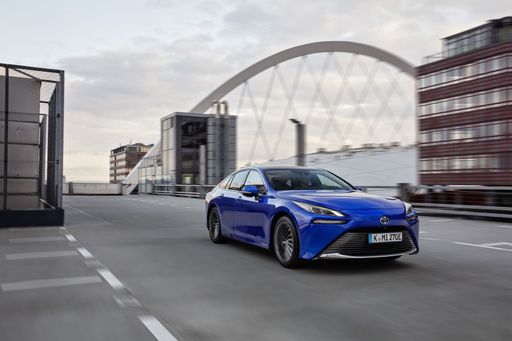 @ Toyota
@ Toyota
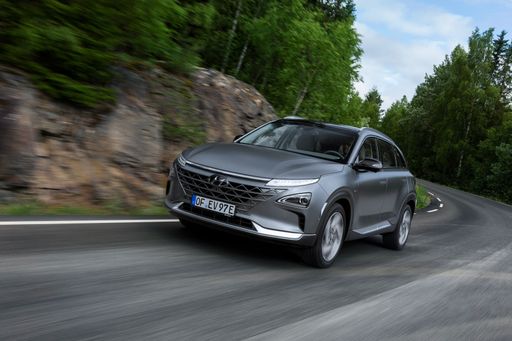 @ hyundai.news
@ hyundai.news
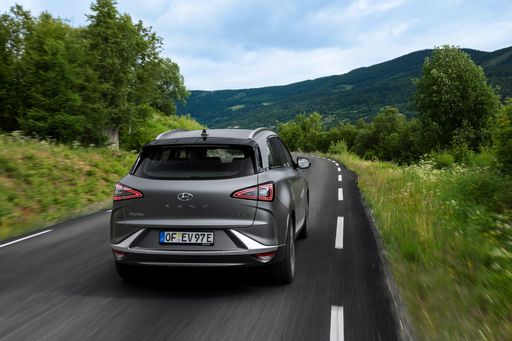 @ hyundai.news
@ hyundai.news
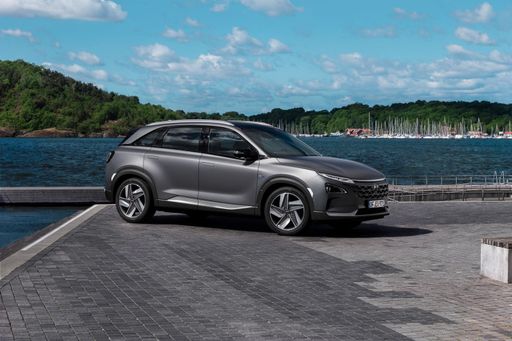 @ hyundai.news
@ hyundai.news
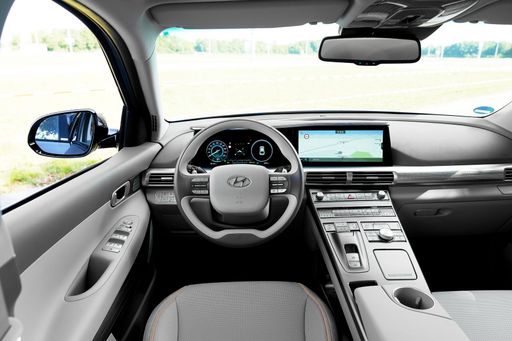 @ hyundai.news
@ hyundai.news

|

|
|
|
|
Costs and Consumption |
|
|---|---|
|
Price
-
|
Price
about 66400 - 71000
£
|
|
Consumption L/100km
-
|
Consumption L/100km
-
|
|
Consumption kWh/100km
-
|
Consumption kWh/100km
-
|
|
Electric Range
-
|
Electric Range
666
km
|
|
Battery Capacity
-
|
Battery Capacity
-
|
|
co2
-
|
co2
0
g/km
|
|
Fuel tank capacity
-
|
Fuel tank capacity
6
L
|
Dimensions and Body |
|
|
Body Type
-
|
Body Type
SUV
|
|
Seats
-
|
Seats
5
|
|
Doors
-
|
Doors
5
|
|
Curb weight
-
|
Curb weight
1889
kg
|
|
Trunk capacity
-
|
Trunk capacity
461
L
|
|
Length
-
|
Length
4670
mm
|
|
Width
-
|
Width
1860
mm
|
|
Height
-
|
Height
1630
mm
|
|
Payload
-
|
Payload
451
kg
|
Engine and Performance |
|
|
Engine Type
-
|
Engine Type
Hydrogen
|
|
Transmission
-
|
Transmission
Automatic
|
|
Transmission Detail
-
|
Transmission Detail
Reduction Gearbox
|
|
Drive Type
-
|
Drive Type
Front-Wheel Drive
|
|
Power HP
-
|
Power HP
163
HP
|
|
Acceleration 0-100km/h
-
|
Acceleration 0-100km/h
9.2 - 9.5
s
|
|
Max Speed
-
|
Max Speed
177 - 179
km/h
|
|
Torque
-
|
Torque
395
Nm
|
|
Number of Cylinders
-
|
Number of Cylinders
-
|
|
Power kW
-
|
Power kW
120
kW
|
|
Engine capacity
-
|
Engine capacity
-
|
|
Top speed
-
|
Top speed
177 - 179
km/h
|
General |
|
|
Model Year
-
|
Model Year
2018 - 2021
|
|
CO2 Efficiency Class
-
|
CO2 Efficiency Class
A
|
|
Brand
-
|
Brand
Hyundai
|
Toyota Mirai
The Future of Driving: Introducing the Toyota Mirai
The Toyota Mirai represents a significant leap forward in automotive innovation, being one of the leading vehicles in the hydrogen fuel cell market. As we continue to search for sustainable transportation solutions, the Mirai stands out with its pioneering technology and exceptional driving features.
Revolutionary Hydrogen Fuel Cell Technology
At the heart of the Toyota Mirai is its groundbreaking hydrogen fuel cell system. Unlike conventional internal combustion engines, the Mirai uses a fuel cell stack to generate electricity through the chemical reaction between hydrogen and oxygen. This process not only powers the car with zero emissions—producing only water vapour as a byproduct—but also delivers a smooth and silent drive.
Technical Specifications and Performance
The Toyota Mirai is designed with performance in mind. It boasts a power output of 182 PS (134 kW) and delivers a robust 300 Nm of torque, allowing it to accelerate from 0 to 100 km/h in just 9.2 seconds. While its top speed is a respectable 175 km/h, it's the Mirai's impressive range that really stands out. The vehicle can travel up to 650 km on a single hydrogen fill-up, making it a practical choice for long-distance travel.
Sophisticated Design and Comfort
Designed as a saloon, the Toyota Mirai combines aesthetic appeal with comfort. Its dimensions—4975 mm in length, 1885 mm in width, and 1470 mm in height—provide a spacious interior for five passengers. The design is sleek and modern, reflecting its advanced engineering. The boot offers 300 litres of storage, suitable for everyday needs.
Advanced Features and Safety
The Toyota Mirai doesn't just excel in propulsion technology; it also includes a range of advanced features to enhance driver comfort and safety. Available in three trims—Advanced, Executive, and Luxury—the Mirai includes state-of-the-art safety systems and infotainment options to ensure a connected and secure driving experience.
Cost and Efficiency
While the price of the Toyota Mirai ranges from €65,990 to €76,290, its monthly running costs—estimated between €1,496 and €1,672—and per kilometre costs of 59.9 to 66.9 cents, reflect the efficient nature of hydrogen-powered vehicles. Considering its innovative technology, the Toyota Mirai offers excellent value for those looking to invest in the future of eco-friendly transport.
The Toyota Mirai: Driving Towards a Sustainable Future
Overall, the Toyota Mirai is more than just a car; it's a vision for the future of sustainable transportation. With its cutting-edge hydrogen fuel cell technology, impressive range, and commitment to zero-emissions driving, the Mirai sets a new standard in environmentally conscious car design. Whether you're an eco-enthusiast or just someone seeking a reliable and technological advanced vehicle, the Toyota Mirai is worth considering.
Hyundai Nexo
Introducing the Hyundai Nexo: A Step into the Future of Automobiles
The Hyundai Nexo represents a groundbreaking stride in the realm of hydrogen-powered vehicles, aligning cutting-edge technology with environmental sustainability. As an SUV, it offers an impressive blend of performance, efficiency, and style, challenging the conventional norms of automotive engineering.
Advanced Hydrogen Technology
At the heart of the Hyundai Nexo's innovation is its hydrogen fuel cell powertrain, a marvel that enables the vehicle to achieve zero CO2 emissions, boasting a remarkable CO2-Effizienzklasse of A. This SUV offers the dual advantages of an eco-friendly footprint with the substantial performance of a traditional combustion engine.
Impressive Performance Metrics
Equipped with a robust 120 kW (163 PS) motor, the Nexo can accelerate from 0 to 100 km/h in a commendable span of 9.2 to 9.5 seconds. This makes the Nexo not just a green choice but also a viable option for those who value brisk acceleration and dynamic driving capabilities. Furthermore, the vehicle manages a top speed of 177 to 179 km/h, showcasing its ability to hold its own on motorways.
Efficient Design and Spacious Comfort
The Nexo’s dimensions, at 4670 mm in length, 1860 mm in width, and 1630 mm in height, underline its role as a spacious and practical SUV. Inside, it comfortably seats up to five occupants, ensuring a luxurious ride experience complemented by its 461-litre boot capacity, ideal for both daily commutes and longer journeys.
State-of-the-Art Features
Hyundai's commitment to excellence is evident in the Nexo’s suite of advanced features. The Prime-Paket trim offers sophistication and practicality, integrating seamless technology with high-quality materials that redefine interior comfort and style. Despite its avant-garde hydrogen technology, Hyundai hasn't compromised on the intuitive user experience.
Cost and Efficiency Analysis
With monthly running costs between €1680 and €1786 and variable costs per kilometre from 67.2 to 71.5 cents, the Hyundai Nexo is an investment in future-oriented automotive excellence. Its distinctive lack of CO2 emissions assures potential owners of its sustainability, while its running costs reflect the premium nature of its innovative technology.
Conclusion: The Future is Hydrogen
The Hyundai Nexo serves as a testament to the potential of hydrogen as a mainstream fuel source. By offering leading-edge technology, notable performance, and unbeatable efficiency, the Nexo positions itself as a beacon of future mobility. For those ready to embrace the next chapter of automotive evolution, the Nexo awaits as a stellar option.
